“Any boat that can outsail your own boat is (a) crewed by professionals, (b) dangerously light and underbuilt, or (c) a hot high-tech expensive racing boat.” –Chuck Gustafson, How to Buy the Best Sailboat
Keep this quote in mind as we prepare for our first race on s/v Patronus, which is (a) crewed by six children under the age of 12, (b) overbuilt, heavy, and safe, and (c) a liveaboard cruising boat…
It had been a while since we were at a marina with shore power so when we investigated the two places with docking, we found that one had a reasonable rate and we were planning on going there. But then we called the Port Louis Marina to get their rates and availability. Chris spoke with Danny, the assistant manager and an avid racer, who informed us that we could get dockage at half price for 10 days if we entered and sailed in the Grenada Sailing Week. It hadn’t crossed our minds to race our home, but half price on dockage sounded good! We invited our friends on s/v Anything Goes to sail with us as we thought everyone would enjoy the experience.
After a quiet Sunday and a fun night watching the Super Bowl at the bar YOLO (You Only Live Once), we were all jazzed up and ready for our big debut on the Caribbean racing scene. Grenada Sailing Week 2013 was already in full swing. In fact, we had missed two of the four days of sailing already! We were placed in the “Fun Class”, which is where they put the boats who race with their laundry, SCUBA tanks, 15 rolls of paper towels, guitar, schoolbooks, teddy bears, 30 pairs of shoes, and 6 kids.
Well, we were in the right place, because we were ready for some fun! Chris and I were beyond excited to introduce our children and our friends on Anything Goes to the world of sailboat racing. Chris and I met on our college racing team and raced for years before having our kids. Racing was a big part of our lives and we have amazing memories from Key West Race week, the many regattas held in Newport, Rhode Island, long distance races, such as Annapolis to Newport, and more. Chris, (and I know I have bragged about his sailing experience before), has done several big races, including the Transatlantic, the Fastnet, and Cowes Week.
We headed out of the marina on Monday morning, following a fleet of boats on their way to the starting line. It was just like old times. We had a crew meeting and Chris got into “total race mode” (he did NOT get the memo that we were in the Fun Class. He was out for blood!). We wore matching outfits and our new Mount Gay Hats (the Barbados rum company that sponsors the regatta) and the kids donned all their pirate gear to put some fear into our competition. The competition pointed and smiled and said, “How cute!” Chris grizzled and almost said, “Break out the Whomper!” (Bonus points if you get that reference).
The Race Committee hoped to have two or three races that day. But first we had to wait around for the committee boat to get the course set. This gave us time to tell stories about our old racing days to the kids. It was all very nostalgic. The races began and since we were the last class to start, we had the opportunity to watch all the other classes do their starts. This was also a great way to teach the kids about one of the best ways to win a race: nail the start. The starting line is an imaginary line drawn between an anchored Race Committee boat and an anchored mark, which is a large, floating ball filled with air. The committee boat uses a series of horns, guns, and flags to signify the start of each race. The idea is to be sailing at full speed just as the gun goes off at the start of the race. You can imagine how difficult this is to do on a sailboat. Now add the fact that a bunch of other boats are also trying to cross that imaginary line at the same time.
Chris is an excellent starter. He always has been. He can “read the line”, which means he can tell which side of the line is favored, accounting for the wind. He can also speed up or slow down with incredible accuracy, so that he crosses the start line exactly when he wants to. A quick thinker, he can also get incredibly close to other boats and have confidence in his knowledge of the rules so that we don’t “foul” another boat and get penalized. There are books filled with the rules of racing, defining every situation and explaining who has the “right of way” in every chance meeting of two boats. Chris seems to have instant access to this information in his mind. In our first race, we had a great start. Let’s allow him to give the particulars, shall we?
The Races, by Chris
We were placed in the “Fun Class” which worked out fine since there was already another Beneteau 473 in the class and we could use their rating. The race committee was very flexible about letting us in even though the regatta had started the day we arrived. We couldn’t race on the second day of the regatta either since we had already planned on running in a “hash”. I’m sure you heard about that from Erica! We prepped the boat for racing, which consisted of removing the bow anchors due to their rules. Other than that, we left our “home” intact! It was a long way from the days of limiting what each person could bring on the boat to save weight. I even filled a water tank the morning of the race since I figured we would probably need to do some dishes during the day with 10 people on board!
I wasn’t sure what to expect since I was essentially racing my home. It had been a while since I had raced, but with 5 minutes to the start of the first race my adrenaline kicked in. It does not seem to matter whether you are on the starting line with Russell Coutts (Gold Medalist and four-time winner of the America’s Cup) or a bunch of cruisers. I immediately went into hyper-competitive mode and just wanted to bury everyone else at the start. Let’s just say that the cruisers are a little easier to beat at the start than Russell Coutts! We were at least 30 seconds ahead of everyone else on every start.
The racing was tough for our boat. We have an inner forestay which required someone to go forward to pull the foot (bottom) of the genoa sail around on each tack. Erica was designated the foot-puller on the first day which left Wendy, Craig and I to run the rest of the cockpit during tacks. As helmsman, I had the easy job, which left Wendy and Craig to tack the Genoa. I would release the sheet (rope that controls the sail) during the tack while Wendy waited to tail (pull) the new sheet until Erica was able to get the foot around the inner forestay. Craig was the designated grinder (person who works the winch to pull in the sheet). It was exhausting work for Craig since by the time the foot came around the inner forestay, the wind was already filling it, making it difficult to get it trimmed in.
I attempted to adhere to a policy of minimizing tacks due to our obvious inefficient means of tacking, but in the second race my aggression got the better of me. Instead of following the principal of trying to overstand the weather mark, we tacked right on the lay line. A wind shift close to the mark meant that we “weren’t making it”, so we had to tack two more times to get around the mark and then had to give right of way to two boats. In the end, we went from being out in front to five minutes behind. We learned our lesson: avoid tacking when you have an inner forestay!
We did manage to set the asymmetrical spinnaker on the downwind legs a few times. This involved first furling the jib since the tack must be secured around the furled genoa. We sailed three races that first day and ended up with a first, a third and a first, which gave us an overall win for the day. Not a bad way to introduce the kids to racing!
The second day was a bit tougher and we ended up with a third and a second for a daily second. After racing only two of the four days, we managed to earn third place overall for the regatta in the Fun Class (let’s just say the other boats in our class had an equally abysmal attendance record as Patronus). The racing was fun for everyone and the kids got to see firsthand what it is like to race large sailboats. We even had a few close mark-roundings, which gave the kids a taste of competitive racing.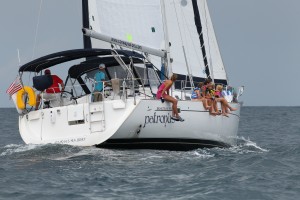
As with any racing environment, the camaraderie creates an instant sailing community. We enjoyed the after-race parties and met the racers on several other boats. The awards ceremony was delightful as we watched the kids go up to the podium to accept our trophies. We won four awards: First Place on Day Three, Second Place on Day Four, Third Place Overall, and Youngest Crew. You can imagine how excited the kids were to get their crew trophy!
John Kolius, America’s Cup Skipper, stated it well: “Sailing is a good sport. You don’t have to beat up the other guy like you do in boxing or football; you just try to outsmart him, and outsail him, and then you go out and have a beer with him.”
Our awards, plus a $100 gift certificate to local marine supply store (which was spent the very next day!)

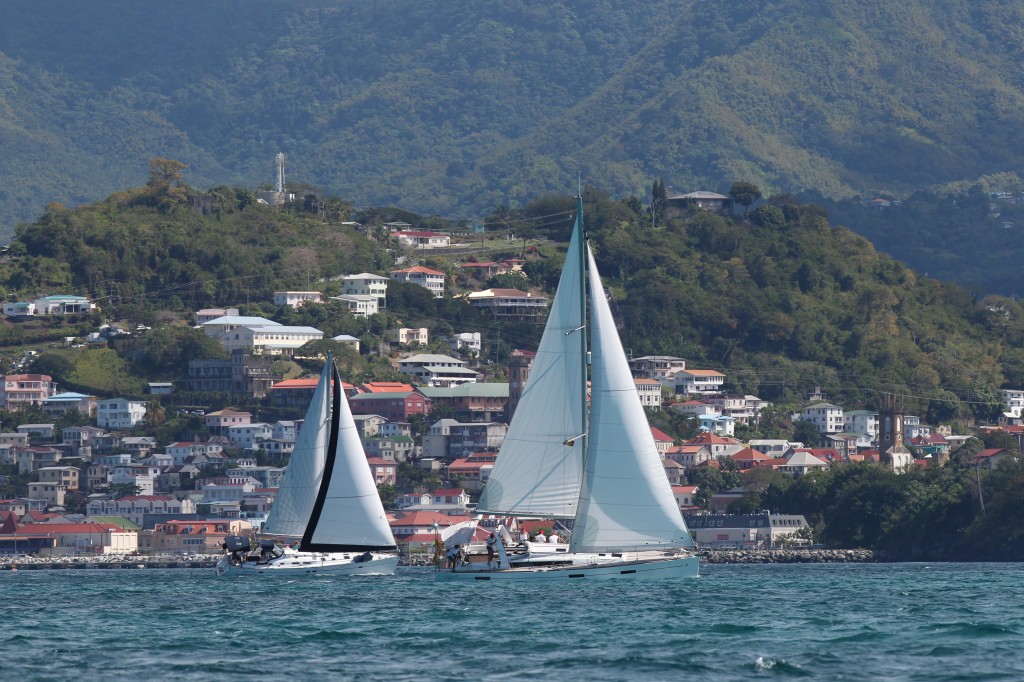
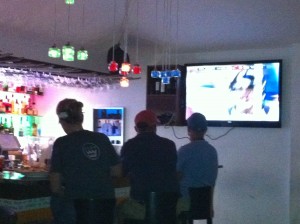
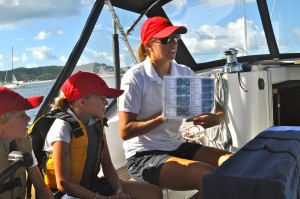
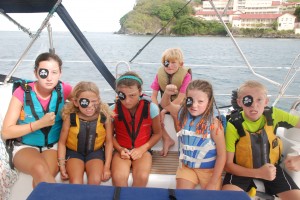
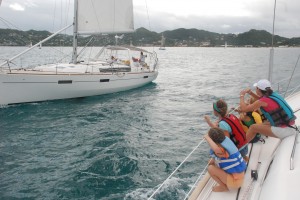
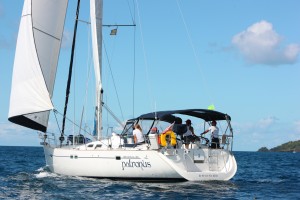
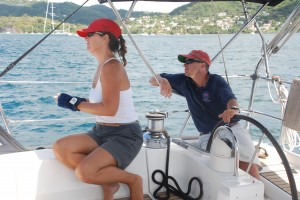
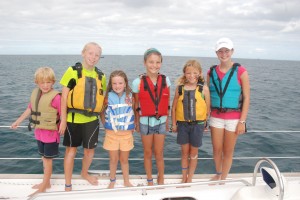
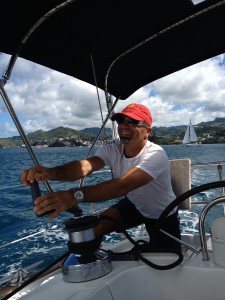
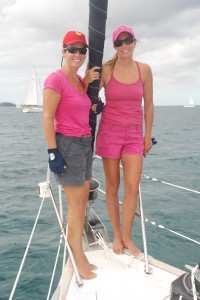
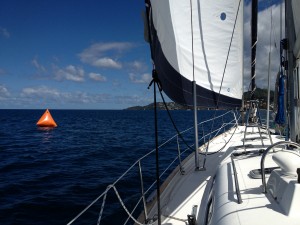
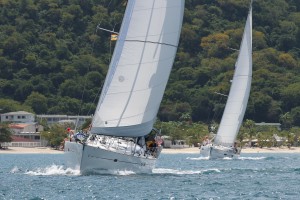
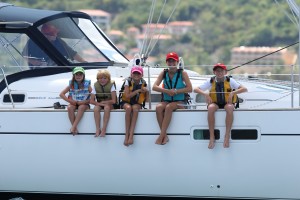
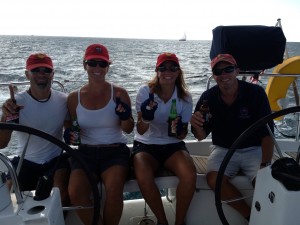
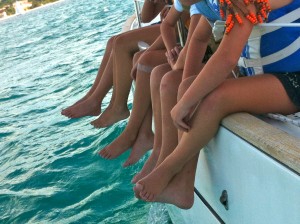
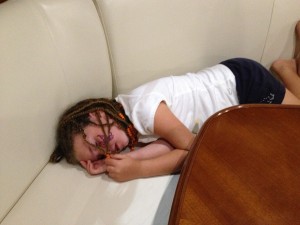
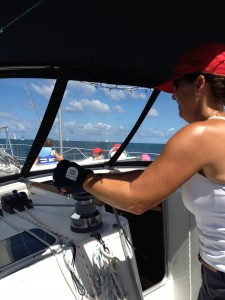
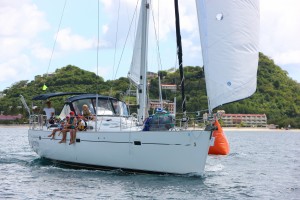
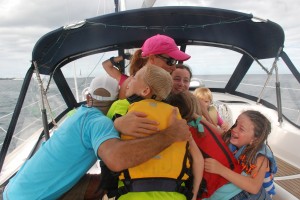
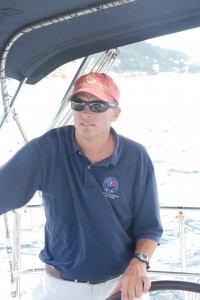
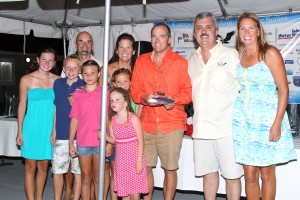
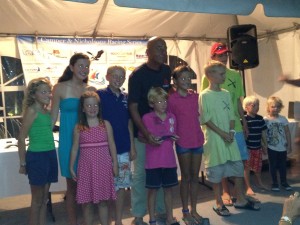
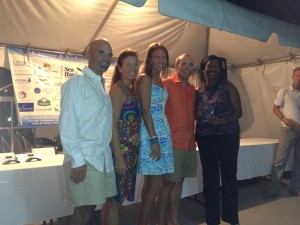
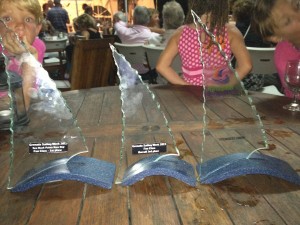
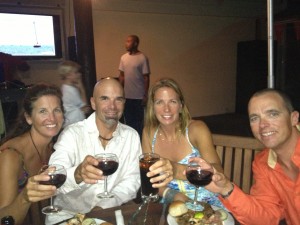
Whomper – big fat spinnaker, noted by all sailors who’ve watched WIND with Jennifer Grey and Matthew Modine, we have the VHS and we watch it at least once a year! Do I win anything?!?!?!
I’m impressed that you did so well in that regatta! Kudos to Patronus!!! Loved the fact that you kept the biminey (sp??, you know what I mean) up. We did a hospice regatta last September with our 2 1/2 yr old son and my parents who are 80 and 72. We had two other crew members and we used the ‘whomper’ too! Quite an experience, we were all exhausted, even though my parents just had to move from side to side with our son in the cockpit. Wish we could have been there with you!